EU Forced Labour Proposal Falls Short on Uyghur Forced Labour

Coalition urges clear procedures to address state-imposed forced labour and require companies to map their supply chains
September 15, 2022
The European Parliament and Council should introduce amendments to strengthen the European Commission’s proposal to enact a ban on goods made with forced labour, the Coalition to End Forced Labour in the Uyghur Region (the Coalition) said today. While the proposed ban has a broad scope, covering all products made with forced labour, it falls short in key respects, particularly on its ability to address state-imposed forced labour such as that occurring in the Xinjiang Uyghur Autonomous Region (Uyghur Region), imposed by the government of China. Recent UN reports have found that systematic abuses against Uyghurs, including forced labour, may constitute crimes against humanity.
“The EU regulation to ban forced labour goods should require meaningful action to end corporate complicity in the suffering of Uyghurs and other Turkic peoples. However, in its current form, the proposal has little capacity to address one of the most pressing cases of forced labour in the world today. The scale and severity of Uyghur forced labour demands a more ambitious approach which includes the possibility to ban imports from a particular region and higher transparency requirements,” said Dolkun Isa, President of the World Uyghur Congress.
The current proposal, released by the European Commission on September 14, prohibits “the placing on the Union market of products made by forced labour,” covering products of any type and provenance, but does not establish a clear mechanism to ban products from an entire region or supply chain tainted by forced labour, which is a critical tool in combating state-imposed forced labour.
Future revisions of the proposal should include an explicit mechanism to ban products from a tainted supply chain or a tainted region where state-imposed forced labour makes credible due diligence impossible, such as all products made from cotton produced in the Uyghur Region, or any good made in the Uyghur Region. The Coalition urges the European Parliament and Council to make amendments to this effect. Banning individual shipments or entities only risks having a limited effect to address the pervasiveness of state-imposed forced labour in EU supply chains, the Coalition said.
While the proposal would establish a public database of forced labour risks in specific geographic areas and linked to specific products, it falls short of requiring companies importing goods to map their supply chains and remains extremely limited on traceability requirements and supply chain disclosure, which could lead to serious limitations to monitor imports of state-imposed forced labour products.
“The European Commission has made an important step forward by presenting this proposal. However, the proposal remains ambiguous on state-imposed forced labour. This ambiguity, coupled with the severe limitations in supply chain transparency requirements, could severely weaken the law’s potential to take action against ongoing corporate complicity in Uyghur forced labour. Given the recent, firm legislation in the US to ban the imports of products made with Uyghur forced labour, we remain concerned that the EU will be a dumping ground for Uyghur forced labour goods without greater clarity and improvements to the proposal,” said Chloe Cranston, Business and Human Rights Manager at Anti-Slavery International.
The proposal begins to address the risk of the EU becoming a dumping ground for forced labour products, in particular following the enforcement of the U.S. Uyghur Forced Labor Prevention Act (UFLPA) in June. The EU regulation should serve as an important incentive for companies with global sourcing operations to apply forced labour-free supply chains as a single global standard.
“The proposal does not make clear that credible due diligence is not possible in contexts of state-imposed forced labour, like the Uyghur Region, which is a major source of raw materials and a manufacturing hub. The European Parliament and Council should introduce strong transparency and supply chain mapping requirements to stop goods from the Uyghur Region that are finished in or shipped through third countries from flooding the EU market,” said Allison Gill, Forced Labor Program Director at Global Labor Justice-International Labor Rights Forum.
The Commission’s proposal comes after previous urging from the Coalition. In May, at a public panel in the European Parliament in Brussels, the Coalition called upon the EU to demonstrate global leadership and design these tools to be effective to respond to the Chinese government’s widespread abuse of the Uyghur people and other Turkic and Muslim-majority peoples.
The EU’s commitment to ban forced labour products adds to the growing economic pressure on the Chinese government to dismantle its system of state-sponsored forced labour in the Uyghur Region. The Coalition therefore reiterates calls on companies to take immediate steps, without waiting for the EU regulation to go into effect, and end their business relationships in the Uyghur Region.
Find out more about the Coalition to End Forced Labour in the Uyghur Region.
